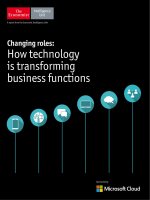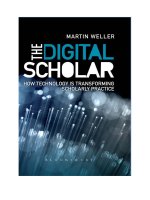(Mẫu powerpoint) how technology is changing education
Bạn đang xem bản rút gọn của tài liệu. Xem và tải ngay bản đầy đủ của tài liệu tại đây (2.33 MB, 16 trang )
A QUICK INFORMATION GUIDE
HOW TECHNOLOGY
IS CHANGING
EDUCATION
A LOOK AT THE IMPORTANCE OF TECHNOLOGY
IN TEACHING AND LEARNING
Agenda
KEY TOPICS DISCUSSED IN
THIS PRESENTATION
• The impact of technology on education
•
•
•
•
•
Setting up a virtual learning space
The role of interactive technology in education
The benefits of interactive technology
Remote learning and the new normal
New trends to watch out for
The Impact of
Technology on Teaching
and Learning
TECHNOLOGY IS A POWERFUL TOOL THAT HAS CHANGED HOW
TEACHERS TEACH AND HOW STUDENTS LEARN. IT HAS
PROVIDED PEOPLE WITH ACCESS TO EDUCATION AND ACCESS
TO DIFFERENT WAYS OF COMMUNICATING AND WORKING
TOGETHER.
Traditional
Teaching and
Learning
• Physical learning materials and equipment
like paper, pens and chalkboard
• Limited access to education materials and
information
• Teaching and learning typically occurs in an
in-person classroom setting
Teaching and
Learning with
Technology
• Wider access to education materials and
information
• More available channels and tools for
communication as well as collaboration
• Enables a more personalized kind of
learning for students
How to set up a virtual classroom
1
2
3
4
5
STEP
STEP
STEP
STEP
STEP
Invest in a
calendar and
comms app.
Select a secure
live streaming
platform.
Choose apps
that foster
collaboration.
Use the necessary
tools to manage
your time well.
Choose a robust
platform that can
help with your
objectives.
Create a learning
environment that
encourages
teamwork.
Pick a learning
management
system.
Review all online
learning
materials.
Study the system so
you can maximize
its use.
Stay prepared and
know how to use the
materials.
Item 5
20%
Item 1
20%
Virtual classroom
adoption in the
world
AS OF JANUARY 2021
Learning sessions are now
conducted online in 95% of
schools in the world.
Item 4
20%
Item 2
20%
Item 3
20%
The Role of Interactive
Technology in Learning
I N T E RA C T I V E T E C H N O LO GY O P E N S U P
T H E WAY W E T E A C H A N D L E A R N
Interactive technology helps create opportunities for
communication. It can encourage teachers and students to
communicate more, share and discuss ideas, and
collaborate with each other.
Benefits of
Interactive
Technology
Benefits to
teachers
H O W T E C H N O LO GY H E L P S T E AC H E R S
DO THEIR WORK
ALLOWS TEACHERS TO
BE MORE FLEXIBLE
HELPS TEACHERS CONNECT
MORE WITH STUDENTS
ALLOWS ACCESS TO
MORE RESOURCES
Teachers can use different teaching
methods and tools to suit their
lessons or students.
Teachers are able to better
communicate with their
students and support them in
their learning
Teachers are able to find
additional and updated learning
resources that can help them
with their work
Benefits
to Students
HOW TECHNOLOGY HELPS
STUDENTS LEARN
ALLOWS FOR A MORE PERSONALIZED
LEARNING EXPERIENCE
Students have more freedom to choose the methods
and tools that help them learn best.
IMPROVES STUDENTS' COMMUNICATION SKILLS
Students have access to different channels where
they can communicate and collaborate with
teachers and fellow students.
HELPS STUDENTS PREPARE FOR THE FUTURE
Students become equipped to face a highly technological future
and will be able to easily adapt.
Remote learning as
the new normal
I T ' S I M P O RTA N T R I G H T N O W B U T
IS IT THE FUTURE?
Remote learning technology has been crucial to
education right now, and it will likely be as critical in the
future as schools determine the best way they can move
forward. Schools can adopt or offer a combination of
remote and in-person learning.
Technology is an effective
tool that can make
education more
meaningful and engaging
for teachers and students
alike.
WHAT'S NEXTIN DIGITAL LEARNING
• ONLINE CLASSROOMS MEAN DIGITAL LEARNING FOR EVERYONE.
• A GLOBAL MARKET FOR PRACTICAL COURSES AND
CREDENTIALS.
• IMPROVEMENT IN THE QUALITY OF BLENDED LEARNING
• RISING DEMAND FOR SKILLS-BASED PROGRAMS.
• GREATER INVESTMENT ON INTERACTIVE TECHNOLOGY IN
SOLVING THE DIGITAL DIVIDE
“We need technology in every
classroom and in every student and
teacher’s hand, because it is the pen
and paper of our time, and it is the
lens through which we experience
much of our world."
DAVID WARLICK
Do you have
any questions?
SEND IT TO US! WE HOPE YOU
LEARNED SOMETHING NEW.
Free
Resources









